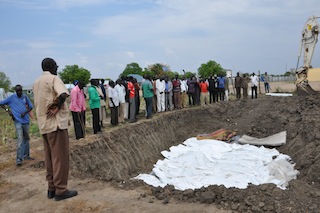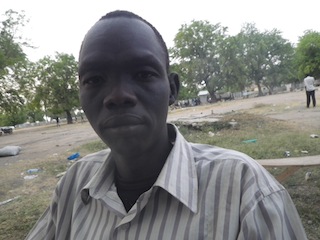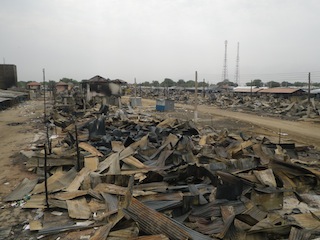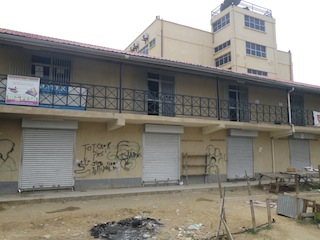Nearly 30 killed in Jonglei’s Kolnyang attack
February 6, 2014 (BOR) – More than 25 people killed in Kolnyang district (payam) of Jonglei’s Bor county on 5 February by armed men suspected to be associated with rebel loyal to South Sudan former vice-president Riek Machar.

Maluak Pach, a native of the area said his relatives had put the death toll at 34.
Manyok Ayuen Malou, who reportedly lost his father during the attack narrated how heavy artillery was used by the unknown gunmen who stormed the area at about 5:30pm.
“Our family is no more, they killed my father and step mother”, said Manyok.
“They came at exactly 5.30 in the evening. They fired RPG [Rocket-propelled grenades] to [my brother] Malou who tried to escape with one vehicle [a track], but they missed him three times,” he added.
The country’s largest state of Jonglei has been one the three regions worst affected by conflict between the government and a rebel group consisting of army defectors and armed civilians loyal to Machar.
Although the conflict was triggered by a power struggle within the country’s ruling SPLM, much of the violence has been along ethnic lines, mostly between South Sudan’s largest ethnic groups, the Dinka and Nuer.

Police officials in Bor said they had not yet received clear details about the incident.
“What we are earning is the that 11 children are still missing. About 30 killed. [The [attackers] went behind Anyidi payam this afternoon but we don’t know where they have reached now. We also heard that the army is following them”, said Atong Jamus, a police official in Bor.
The state capital changed hands between Machar’s rebel force and the government – backed by the Ugandan military – four times since fighting began on 15 December.
Two people, including pastor Deng Yaau, whose wife and child were killed in the same attack, were among the wounded in Bor hospital.
“When the problem began in Bor in December 16, we ran to the bush behind Kolnyang. We felt safe in the bush till we returned to the village when the SPLA entered Bor. I did not know that this would happen,” Yaau said.
COMMISSIONER CONFIRMS

”The attackers killed people indiscriminately and most of the victims are children, women and elderly villagers,” Alier told Sudan Tribune from Bor.
Kolnyang, which is around 30km northeast of Bor, was attacked by armed men from west and south, commissioner Alier said without saying who attackers could have been.
No shops are functioning now in Bor to provide food for those who have returned to the town since it was retaken by the government.
Many people who were displaced to Lakes state returned to Bor by boats on Thursday morning but returned to the afternoon.
The United Nations says that 873,800 people have been displaced by crisis, 130,400 of whom have fled to other countries, including 29,100 to Ethiopia.

Most houses and some of the best shops that were not destroyed during the conflict now bear names of Nuer men in an apparent effort to claim them.
Tot Gok from Pieri payam of Uror county whose Ruben Kok Alat apartment in Bor Marol market as his and Bol Matai were some of the names witnessed by Sudan Tribune.
BURIALS CONTINUE IN BOR
The collection and burial of dead bodies in Bor town is still continuing almost three weeks after the town was retaken from the rebels on January 18.

A local youth leader, Ayar Monywach has called upon the youth to embark on town, as cleaning “it is the top priority now”.
More than 1,000 civilians from the Dinka and other tribes, including Ugandans, Kenyans, Sudanese, Ethiopians and Somalians that lived in Bor are believed to have been killed since the war begun.
THOUSANDS DISPLACED IN JONGLEI
About 150,000 families displayed from Bor; settled in Mingkaman [Guol-yar] of Awerial County are getting little support from the International Committee of the Red Cross (ICRC) and other humanitarian agencies. Over 70,000 households had received food aid and non food items from ICRC there.
Hundreds of Dinka Ngok civilians from Pigi County, who have spent about a month in the bush are now seeking humanitarian support in Upper state’s Maluit county.
Speaking to Sudan Tribune by phone, Santo Deng, one of the displayed persons in the camp said Pigi commissioner and officials from Maluit recently visited their two camps.
“We have not receive any assistance or even see any humanitarian agency here since we came. People are suffering,” said Deng, adding “There is “no food”.
He accused Ga-jak and Lou Nuer clans, among those responsible for devastating their areas.
“They killed all the elderly people. we were caught unaware. They took everything, including any thing that moves[ all domestics animals], only trees were left standing in the villages”, he said.
(ST)
